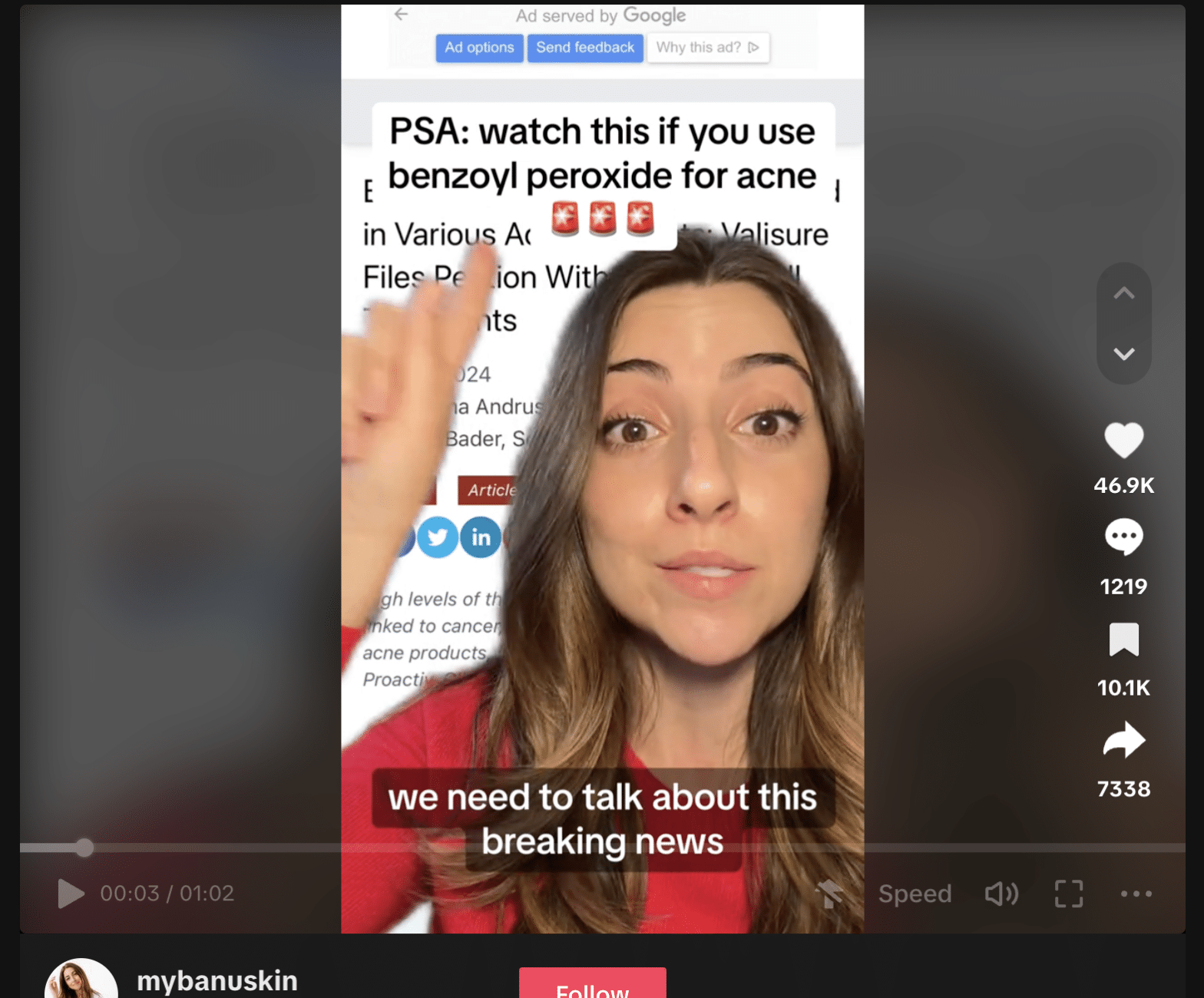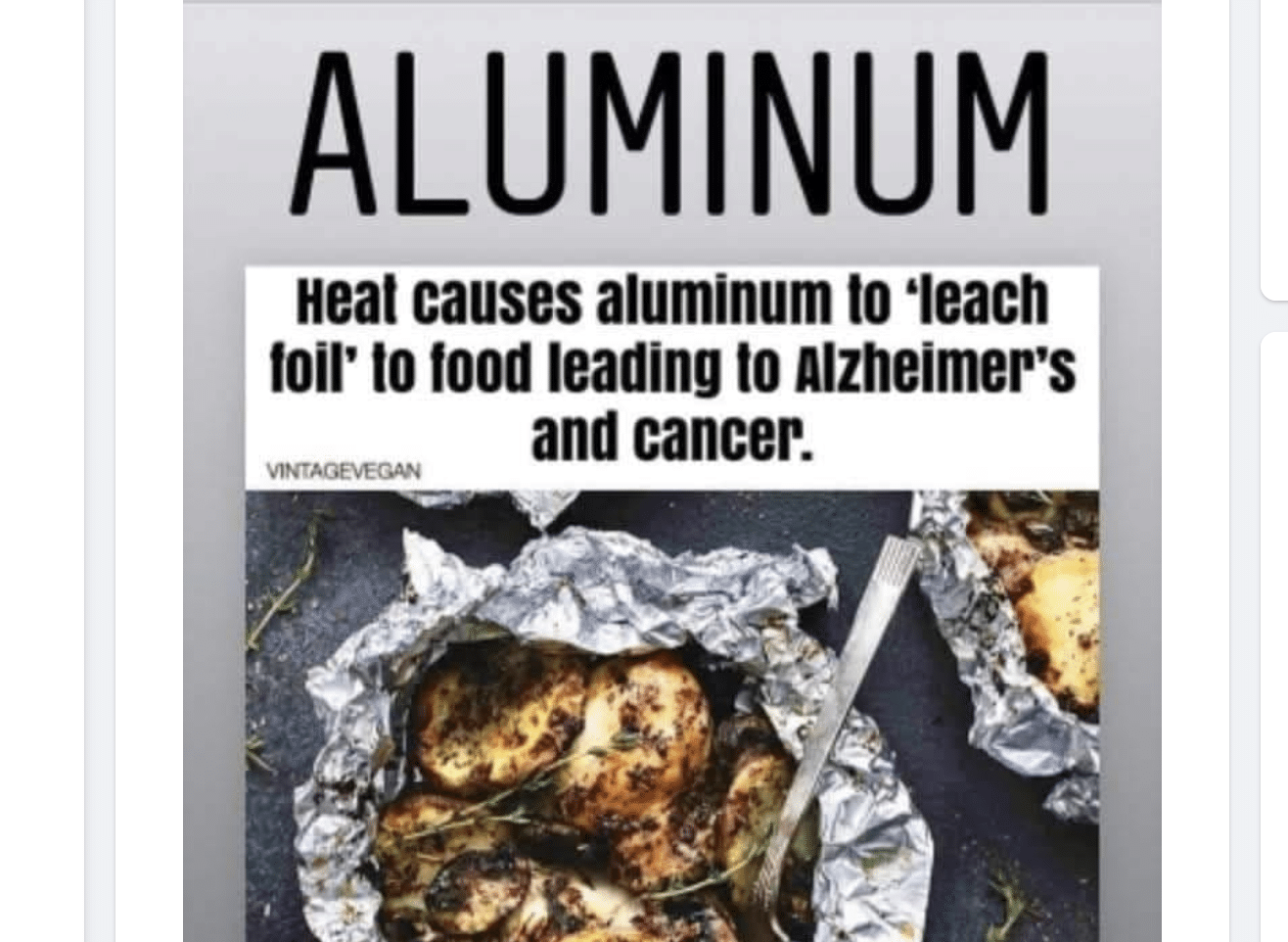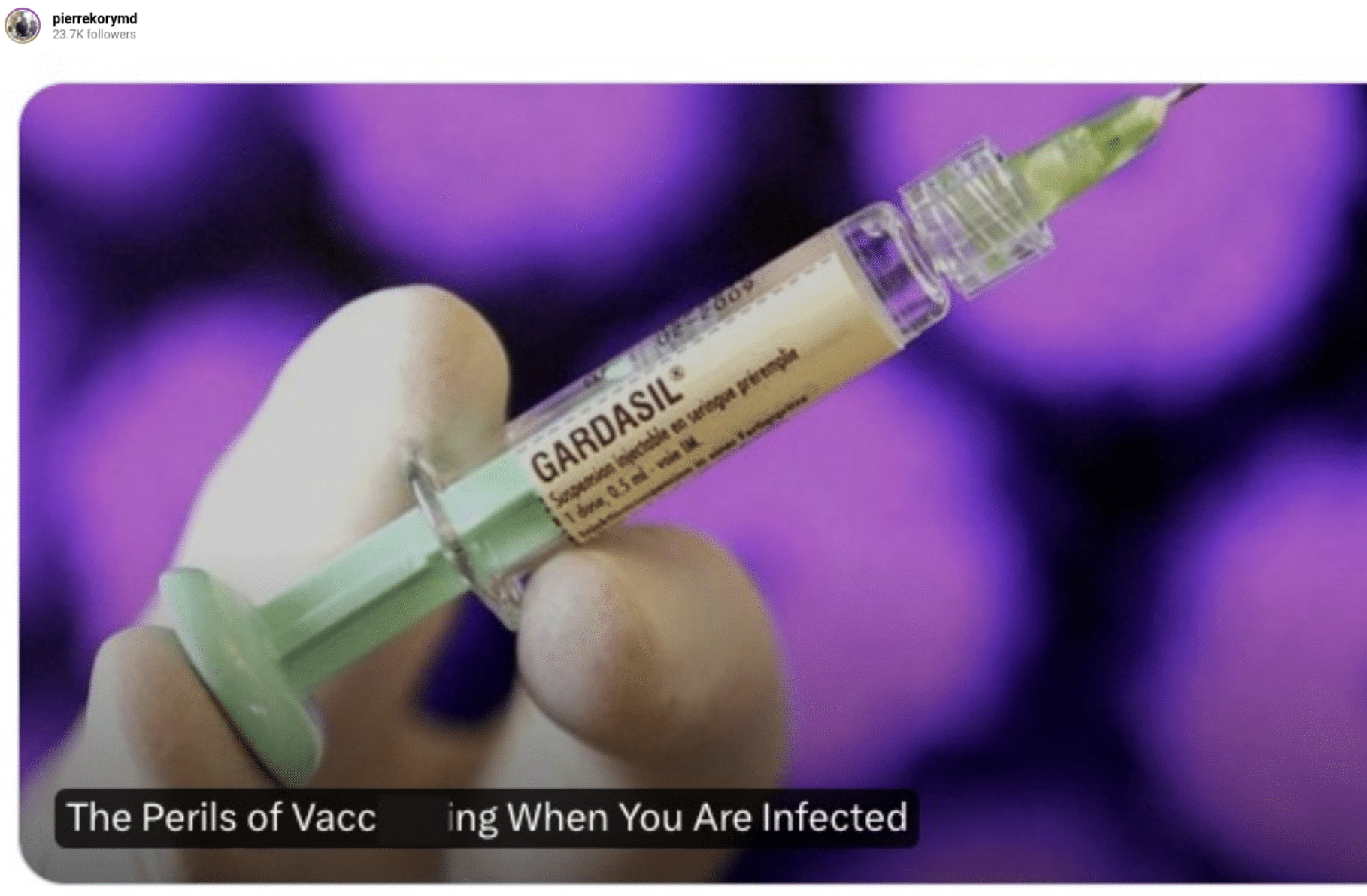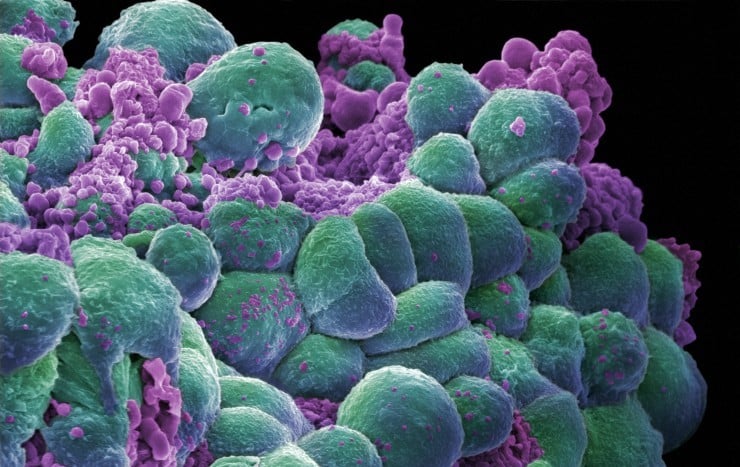- Health
Insufficient evidence for the claim that benzoyl peroxide in skincare products poses cancer risk
Key takeaway
Benzoyl peroxide is commonly used to treat the skin condition acne. It can decompose into benzene when exposed to heat. Benzene is a known cancer-causing substance in humans linked to several blood cancers. However, it cannot be completely avoided as it’s part of our environment. We’re exposed to it on a daily basis from things like car emissions, gasoline vapors, and cigarette smoke. To reduce benzene exposure from the decomposition of benzoyl peroxide, it’s important to store benzoyl peroxide-containing skincare products properly and avoid exposing them to heat.
Reviewed content

Verdict:
Claim:
Benzene in benzoyl peroxide-containing skincare products poses a cancer risk
Verdict detail
Lacks context: The observation that certain skincare products produced high levels of benzene involved storage at elevated temperatures of 40, 50 and 70°C for several days to weeks. These conditions don’t represent how people typically use and store skincare products.
Inadequate support: While the Valisure report provides important information on safely storing skincare products, it didn’t establish that using benzoyl peroxide-containing skincare products is associated with a higher risk of cancer. Additional research is needed to better address this concern.
Full Claim
High levels of cancer-causing chemical found in benzoyl peroxide-containing skincare products; “If you use acne treatment, you could be at severe risk [of cancer]”
Review
In early March 2024, media reports that skincare products contained high levels of benzene generated concern regarding the safety of these products. Benzene is a known cancer-causing chemical (carcinogen). These reports followed the publication of a U.S. Food and Drug Administration (FDA) citizen petition by Valisure, an independent analytics laboratory, calling on the FDA to recall these products.
This petition was based on the results of Valisure’s stability testing of benzoyl peroxide (BPO)-containing skincare products. Benzoyl peroxide is commonly used to treat acne, which affects around 85% of teenagers.
In their newsroom article, Valisure asserted that these products “can form over 800 times the conditionally restricted FDA concentration limit of 2 parts per million (ppm) for benzene, and the current evidence suggests that this problem applies broadly to BPO products currently on the market”.
Social media posts, such as these videos on TikTok, quickly followed these reports. These posts implied that Valisure’s findings meant people using BPO-containing products were at a greater risk of developing cancer. These posts received millions of views in total.
In this review, we discuss the methods used by Valisure in their stability testing. We also explain why Valisure’s findings don’t necessarily imply that using BPO-containing skincare products would place a person at a higher risk of cancer.
Why and how did Valisure conduct stability testing of the products?
In the petition, Valisure explained that benzoyl peroxide, an ingredient commonly used in skincare products targeting acne, is well-known to decompose into benzene when subjected to heat.
Because benzene is a known cancer-causing chemical, the concern is that benzoyl peroxide could pose a health risk if products containing the chemical are stored at elevated temperatures.
Several regulations and recommendations have been established to reduce the health risk posed by benzene. The FDA established a concentration limit of two ppm for benzene in cases where its use in a drug is “unavoidable”.
Valisure set out to determine how much benzene was present in various skincare products at different temperatures and whether the level was within the FDA’s established limit.
Their initial testing included 175 acne treatment products. 99 contained BPO and 76 contained other ingredients that target acne, such as salicylic acid and adapalene.
They found no detectable benzene in products that didn’t contain BPO. But they reported that 94 of the 99 products with BPO “contained benzene without any elevated temperature incubation”. However, Valisure didn’t report the levels of benzene they detected. As such, it’s unknown whether the benzene levels here exceeded the FDA limit. Science Feedback reached out to Valisure for clarification and will update this review if new information becomes available.
Valisure performed another round of testing, this time looking at the levels of benzene after leaving products at temperatures greater than room temperature, specifically 37°C, 50°C, and 70°C. They reported that “[i]n 18 days of stability testing at 50°C, Valisure detected over 1,500 ppm of benzene produced in 2 products, over 100 ppm in 17 products, and over 10 ppm in 42 products”.
Additionally, they also reported that at 70°C—which according to Valisure is the temperature of a hot car—the amount of benzene produced from one product (Proactiv) was roughly 29 ppm.
They asserted that if this amount of benzene was dispersed into a 100 cubic foot compact vehicle, it would produce benzene levels “at approximately 1,270 times the EPA calculated threshold […] for increased cancer risk by long-term inhalation exposure to benzene”.
Reckitt, which produces Clearasil that was reported by Valisure as containing high levels of benzene, criticized the temperatures used by Valisure as unrealistic for not reflecting the actual conditions in which people store their skincare products.
Similarly, cosmetic chemist Perry Romanowski told beauty magazine Allure that “no one is going to store their anti-acne products in a car that is going to get to 70 degrees Celsius for weeks on end”.
Michelle Wong, a cosmetic chemist and science communicator behind the blog Lab Muffin Beauty Science, highlighted some anomalies with Valisure’s report in her TikTok videos.
For instance, Valisure cited a 2006 conference paper as evidence that they had tested a temperature relevant to a hot bathroom (40 degrees Celsius).
However, the paper, which looked at the humidity and temperature of a bathroom, only recorded about 35 degrees Celsius as the highest temperature. Furthermore, this temperature lasted for roughly 15 minutes.
Wong also explained that the level of benzene produced from a Proactiv product at 70 degrees Celsius—considered by Valisure to be the temperature of a hot car—wasn’t as alarming as the report made it out to be.
Based on Valisure’s measurements, a person would be exposed to 0.508 ppm of benzene in the car. But “[this] is still around or below the eight-hour occupational limit for most countries,” she pointed out.
In other words, that level is still safe enough for a person to breathe in a car for eight hours, she said.
Speaking to Chemical and Engineering News, David Light, Valisure’s co-founder and president, defended their method, stating that it simulates how a product behaves over the long term. “It’s not meant to copy the exact conditions of what a person is going to use every day; it’s meant to understand the full life cycle and ensure the safety of that full life cycle of the product,” he said. Light is listed as an inventor on a patent for methods to reduce benzene formation in benzoyl peroxide-containing products.
No evidence associating the use of benzoyl peroxide-containing skincare with an increased risk of cancer
Do the findings indicate that using benzoyl peroxide increases a person’s risk of cancer?
Science Feedback reached out to John Barbieri, an assistant professor at Harvard Medical School and co-chair of the American Academy of Dermatology Acne Guidelines Work Group, to address these questions.
In an email, Barbieri pointed out that benzoyl peroxide has been used for decades to treat acne “both in over-the-counter and prescription products, without any concerning findings in studies evaluating the potential risk of cancer associated with benzoyl peroxide use”. Currently, there is no direct evidence linking the use of BPO-containing products with an increased risk of cancer, he said.
Valisure’s finding that benzene does occur in BPO-containing products due to heat exposure indicates that people should discard these products if they are exposed to high temperatures, he cautioned.
However, he also noted that Valisure’s report is limited by the lack of transparency regarding the data they acquired from testing at actual storage conditions. “We need Valisure to provide full and transparent access to their data to guide policy decision making and we need other labs to verify this report,” he said.
Barbieri also spoke about the Valisure findings in more detail in this YouTube video, which may be of interest to readers.
In response to Valisure’s findings, the American Academy of Dermatology released a statement on 8 March 2024, stating that it was awaiting further information from the FDA before making any decisions. It also added that individuals concerned about benzoyl peroxide can opt to use other acne-targeting ingredients instead, like salicylic acid and adapalene.
It’s important to keep in mind that there are multiple sources of benzene that already exist in our environment. According to the U.S. Centers for Disease Control and Prevention, we are exposed to benzene on a daily basis from things like car emissions, gasoline vapors, and cigarette smoke. There’s no question that benzene can cause harm, but the risk it poses—meaning how likely it is to produce harm—in a given situation is less clear.
There is still a limited amount of data regarding how benzene in personal care products could affect people. Notably, a group of researchers looked into blood benzene levels of the U.S. population using data from the National Health and Nutrition Examination Survey, following Valisure’s 2021 report that it detected benzene in sunscreen.
Interestingly, the researchers found that individuals who reported using sunscreen had lower levels of benzene in the blood compared to individuals who reported never using sunscreen[1]. This led the researchers to hypothesize that sunscreen use is unlikely to pose a significant risk of benzene exposure.
That said, their findings also come with important caveats. For instance, the data used came from a period of time before Valisure conducted its sunscreen testing in 2021. Moreover, the researchers had no information on when blood samples were taken relative to sunscreen exposure. If blood samples tended to be taken long after sunscreen use, it’s possible that a potential elevation in benzene was missed.
Conclusion
In summary, Valisure’s findings point to the importance of storing BPO-containing skincare products correctly and avoiding heat exposure.
However, they don’t provide sufficient grounds for claims that using BPO-containing products increases a person’s risk of cancer. While the temperatures used in the stability testing simulate how much BPO can break down after several years, they don’t accurately reflect how people typically use and store their skincare products. As such, the relevance of the findings to the real world is unclear.
Additionally, the Valisure report didn’t provide any data on whether a person’s use of BPO-containing skincare products substantially increases their exposure to benzene when those products aren’t exposed to heat. It also didn’t establish that using BPO-containing products is associated with a greater risk of cancer. More research in this area is needed to answer this question.
Scientists’ Feedback

Assistant Professor, Harvard Medical School
There is not direct evidence that use of benzoyl peroxide containing skincare products is associated with an increased risk of cancer. Benzoyl peroxide has been used for decades as a common acne treatment, both in over-the-counter and prescription products, without any concerning findings in studies evaluating the potential risk of cancer associated with benzoyl peroxide use.
An issue with the Valisure report is that they do not provide transparent and full data on testing at appropriate storage conditions. As a result, we need Valisure to provide full and transparent access to their data to guide policy decision making and we need other labs to verify this report. Nevertheless, their findings highlight that benzoyl peroxide products should be discarded if they are exposed to high temperatures, as this increases their risk of breaking down into benzene, which is a molecule associated with cancer risk in other settings.
UPDATE (22 March 2024):
We updated the review to include comments about Valisure’s testing by cosmetic chemist Michelle Wong. This information was added to paragraphs sixteen to twenty-one.
REFERENCES
- 1 – Chang et al. (2022) Sunscreen use is not associated with increased blood concentrations of benzene among adults in the United States: Data from the National Health and Nutrition Examination Survey 2003-2006 and 2009-2018. Journal of the American Academy of Dermatology.



